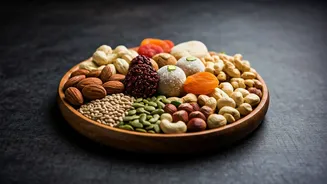Diwali's Sweet Traditions
Diwali, the festival of lights, is a celebration deeply intertwined with culinary traditions. The air fills with the aroma of freshly made sweets, representing
prosperity and happiness. Many households prepare or purchase an array of traditional treats, rich in sugar, ghee, and various nuts. This customary practice can sometimes lead to an overconsumption of calories and sugar, potentially impacting health, particularly for those managing conditions such as diabetes or heart ailments. While the intentions behind these sweets are purely celebratory, the nutritional implications often warrant consideration and moderation to maintain well-being during the festive period.
Hidden Health Challenges
Traditional Diwali sweets, while delightful to the taste buds, often present hidden health challenges. Many of these treats are prepared with copious amounts of sugar, which can cause significant blood sugar spikes, especially for individuals susceptible to diabetes or those already diagnosed. Additionally, the use of ghee and excessive nuts contributes to a high-fat content, which when consumed in excess may elevate cholesterol levels. Furthermore, the high calorie density in many sweets contributes to weight gain if not balanced by adequate physical activity. It is therefore crucial to be mindful of portion sizes and the frequency of consuming these sweets to mitigate potential health risks during Diwali.
Mindful Eating Practices
Embracing mindful eating practices can help you enjoy Diwali sweets responsibly. Start by paying attention to your body's hunger and fullness cues. Instead of mindlessly consuming sweets, savour each bite and be aware of the flavours and textures. This helps you to fully appreciate the treat while preventing overeating. Another key aspect is portion control. Pre-portioning sweets or opting for smaller servings can prevent excessive consumption. Try balancing sweets with healthy foods like fruits and vegetables, and drink plenty of water to feel full and hydrated. Being mindful of your food choices will lead to a healthier and more enjoyable festive season.
Healthier Treat Swaps
Exploring healthier swaps is a smart approach for enjoying Diwali sweets while maintaining your health. Consider making alterations to classic recipes. For instance, using jaggery or natural sweeteners like dates or honey instead of refined sugar can lower the glycemic index of your desserts. Employing whole wheat flour instead of refined flour can also increase the fibre content. Incorporating fruits, nuts, and seeds adds nutritional value and makes the treats more filling. You can also experiment with recipes that use less ghee or oil. By making these smart substitutions, you can enjoy the spirit of Diwali without compromising your well-being.
Balancing Sweet Consumption
A balanced approach is important during Diwali to ensure you enjoy the festivities without adverse effects on your health. Don't deprive yourself completely of traditional sweets. Instead, focus on a balanced diet incorporating whole foods, fruits, vegetables, and lean proteins, which help you feel full and satisfied. Regular exercise can also help to manage the extra calories and keep your metabolism active. Plan your meals and snacks ahead of time to make conscious food choices, and ensure you're drinking adequate water. By adopting a well-rounded strategy, you can enjoy Diwali's sweets responsibly.
Making Healthy Choices
Making informed choices allows you to enjoy the festive season without compromising your health goals. Before indulging in a sweet, try to assess its ingredients and nutritional value. Read labels if buying pre-made sweets, paying attention to sugar content and fat levels. Prioritize homemade sweets where you can control the ingredients and amounts. When presented with choices, opt for smaller portions or sample a variety of sweets rather than consuming large quantities of a single one. This approach enables you to enjoy the festive spirit while making conscious decisions about your dietary intake.













